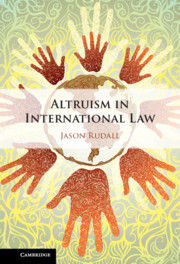Book contents
- Altruism in International Law
- Altruism in International Law
- Copyright page
- Dedication
- Contents
- Preface and Acknowledgements
- Introduction
- 1 Altruism
- 2 The Making of Altruism in International Law
- 3 The Substance of Altruism in International Law: Cooperation for the Other
- 4 The Substance of Altruism in International Law: Protection for the Other
- 5 The Substance of Altruism in International Law: Development for the Other
- 6 The Substance of Altruism in International Law: Environmental Justice for the Other
- 7 The Form of Altruism in International Law
- Conclusion
- Select Bibliography
- Index
6 - The Substance of Altruism in International Law: Environmental Justice for the Other
Published online by Cambridge University Press: 06 August 2021
- Altruism in International Law
- Altruism in International Law
- Copyright page
- Dedication
- Contents
- Preface and Acknowledgements
- Introduction
- 1 Altruism
- 2 The Making of Altruism in International Law
- 3 The Substance of Altruism in International Law: Cooperation for the Other
- 4 The Substance of Altruism in International Law: Protection for the Other
- 5 The Substance of Altruism in International Law: Development for the Other
- 6 The Substance of Altruism in International Law: Environmental Justice for the Other
- 7 The Form of Altruism in International Law
- Conclusion
- Select Bibliography
- Index
Summary
This chapter considers the major features of international environmental governance that are manifestations of altruism. It begins from the observation that the very premise of international environmental law is the no-harm principle which, while not altruistic per se, illustrates the structurally inherent concern for the other at the heart of the regime. The chapter continues by appraising the emergence of concern for the individual, and in particular procedures through which those in other countries can participate in environmental decision-making or have recourse to justice where they are subject to environmental harm. Moreover, international human rights law is interacting with international environmental law to extend the environmental obligations that states have to people third countries. The universality of international environmental law obligations is also manifested in principles such as intergenerational equity, which is an altruistic consideration for people of the future. Finally, the chapter considers the increasing prevalence of common but differentiated responsibilities and commitments made to developing countries in the area of environmental protection. A particular focus is placed on the importance of financial and technical assistance.
Keywords
- Type
- Chapter
- Information
- Altruism in International Law , pp. 182 - 216Publisher: Cambridge University PressPrint publication year: 2021



